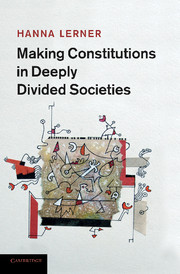Book contents
- Frontmatter
- Contents
- Acknowledgments
- Introduction
- PART I Constitutions, democracy, identity
- PART II Varieties of constitutional incrementalism
- 3 Informal consociationalism in Israel
- 4 Constructive ambiguity in India
- 5 Symbolic ambivalence in Ireland
- PART III Arguments for and against constitutional incrementalism
- Conclusion
- Bibliography
- Index
4 - Constructive ambiguity in India
Published online by Cambridge University Press: 25 October 2011
- Frontmatter
- Contents
- Acknowledgments
- Introduction
- PART I Constitutions, democracy, identity
- PART II Varieties of constitutional incrementalism
- 3 Informal consociationalism in Israel
- 4 Constructive ambiguity in India
- 5 Symbolic ambivalence in Ireland
- PART III Arguments for and against constitutional incrementalism
- Conclusion
- Bibliography
- Index
Summary
The real work of this Constituent Assembly … is the high adventure of giving shape, in the printed and written word, to a Nation's dream and aspirations.
Jawaharal Nehru, Constituent Assembly Debates, vol. I, p. 59One of the major political goals of India's leaders at independence was to forge a common national identity in the face of unparalleled social and cultural diversity. Translating this goal into legal language of constitutional formulations was the greatest challenge for the Indian Constituent Assembly when it drafted the constitution between December 1946 and January 1950. The aim of this chapter is to examine how the Indian framers addressed this challenge and how they navigated the country's seemingly irresolvable tensions.
India, the second most populated country in the world, is one of the most diverse in religious, cultural, ethnic and linguistic terms. The Muslim community is the largest religious minority in India. Constituting roughly 20 percent of India's population prior to partition, even after partition the Muslim community still comprised 10 percent of the population, making India the third largest Muslim country in the world. Other important religious minorities are Sikhs, Christians, Buddhists, Jains and Parsis; all together their share in the population is around 5 percent. Hindus, who comprise around 83 percent of India's population, are themselves socially segmented into thousands of sects, castes and subcastes, traditionally stratified and ranked in hierarchical order. India is extremely linguistically diverse as well.
- Type
- Chapter
- Information
- Making Constitutions in Deeply Divided Societies , pp. 109 - 151Publisher: Cambridge University PressPrint publication year: 2011



